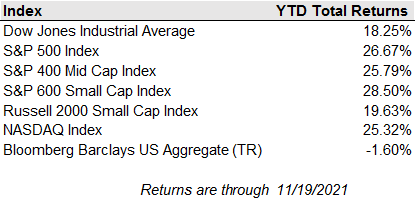The major indices had mixed returns last week with the Dow Jones down 1.29%, and the NASDAQ and S&P 500 both up 1.27% and .36%, respectively. Concerns of rising Covid cases in Europe led to the tech stocks outperforming the other sectors. Germany saw a record high new cases last week, and Netherlands and Austria have introduced partial lockdowns. Other countries within Europe are trying to avoid the restrictions that caused severe economic harm in 2020.
President Biden picked Jerome Powell for a second term as Fed Chair. After guiding the Federal Reserve and economy through the pandemic, his next challenge will be easing inflation. The market likes consistency, and slightly rose after the announcement Monday morning.
The strong 1.6% month over month rebound in industrial production in October came as the unwinding of earlier hurricane-related disruption and a partial recovery in auto production boosted manufacturing. But with global supply problems likely to persist, we doubt that rapid pace of growth will last. We expect labor and materials shortages to remain. For example, machinery output fell by 1.3% last month, partly due to the one-month strike at John Deere.
Infrastructure week finally arrived, with President Biden signing the bill into law on Monday. The infrastructure bill is often touted as a $1.2bn package, but much of that is re-purposed funds. Only $550bn is “new” money and, after accounting for the revenue offsets, the Congressional Budget Office estimates that the bill will add $250bn to the deficit over the next decade.
Thanksgiving is this Thursday, and it will cost more than it has in the past. Expect the turkey (or ham) to cost 12% more than last year, salad dressing will cost almost 8% more, and your aunt’s fruit salad will cost her 3% more than last year. The reason for the price increases is that the items are in shorter supply this year, so if you have not done your Thanksgiving grocery shopping, you may want to go now.


